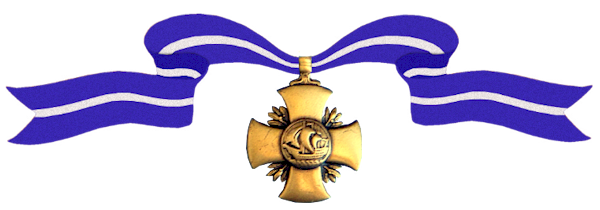Jacob Cooper graduated from the U.S. Naval Academy at Annapolis, Class of 1926. He retired as a U.S. Navy Rear Admiral.

–
Awards Received
-

Silver Star
-

Silver Star
-

Navy Cross
-

Navy Cross
-
Silver Star
Service:
United States NavyRank:
Commander [then Lieutenant Commander]Division:
U.S.S. John D. Ford (DD-228)Action Date:
February 27, 1942
Bureau of Naval Personnel Information Bulletin No. 306 (September 1942)The President of the United States of America takes pleasure in presenting the Silver Star to Commander [then Lieutenant Commander] Jacob Elliott Cooper, United States Navy, for conspicuous gallantry and intrepidity as Commanding Officer of the Destroyer U.S.S. JOHN D. FORD (DD-228), during the Battle of the Java Sea, 27 February 1942, and in offensive daylight action against the Japanese Battle Line of heavy and light cruisers. Courageous and aggressive in the face of severe enemy fire, Commander Cooper fought his ship boldly throughout this hazardous engagement, going in unsupported, as a unit of a Destroyer Division, to deliver a successful torpedo attack in two stages against the Japanese cruisers, forcing them to break off the attack and enabling the Allied ships to regain their battle formation. Commander Cooper’s inspiring leadership and the valiant fighting spirit of the officers and men under his command highest credit reflect great credit upon himself and the United States Naval Service.
-
Silver Star
Service:
United States NavyRank:
Captain [then Commander]Division:
U.S.S. Drayton (DD-366)Action Date:
November 30 – December 1, 1942
Bureau of Naval Personnel Information Bulletin No. 306 (September 1942)The President of the United States of America takes pleasure in presenting a Gold Star in lieu of a Second Award of the Silver Star to Captain [then Commander] Jacob Elliott Cooper, United States Navy, for conspicuous gallantry and intrepidity as Commanding Officer of the Destroyer U.S.S. DRAYTON (DD-366), during action against enemy Japanese Naval Forces in the Battle of Lunga Point, the night of 30 November – 1 December 1942. With his ship the fourth in column of the van destroyers when Japanese surface forces steamed toward Guadalcanal in a last major attempt to reinforce beleaguered enemy troops on the island, Captain Cooper promptly maneuvered for maximum strength to launch his devastating torpedo and gunfire attacks and, despite the enemy’s terrific counterfire, contributed to the success of a bitterly fought engagement to drive the hostile force from the area. Proceeding to the aid of the NORTHAMPTON which had been severely damaged during the furious action, he remained in submarine-infested waters in company with another destroyer for a period of more than two and a half hours to assist in the rescue of large numbers of survivors. His superb seamanship, dauntless perseverance and zealous devotion to duty throughout were essential factors in the success of the engagement and subsequent rescue operations and reflect the highest credit upon Captain Cooper and the United States Naval Service.
-
Navy Cross
Service:
United States NavyRank:
Lieutenant CommanderDivision:
U.S.S. John D. Ford (DD-228)Action Date:
January 23 – 24, 1942
Bureau of Naval Personnel Information Bulletin No. 306 (September 1942)The President of the United States of America takes pleasure in presenting the Navy Cross to Lieutenant Commander Jacob Elliott Cooper, United States Navy, for extraordinary heroism and distinguished service in the line of his profession as Commanding Officer of the Destroyer U.S.S. JOHN D. FORD (DD-228), and for extreme disregard of personal safety, devotion to duty, courage, leadership and alertness in successfully delivering a determined attack with torpedoes and gunfire during action with the enemy. On the night of 24 – 25 January 1942, the PAUL JONES, together with the U.S.S. PAUL JONES (DD-230) and U.S.S. PARROTT (DD-218), delivered an attack upon enemy surface ships off Balikpapan, Borneo, Netherlands East Indies. The composition of the enemy’s concentration was known to consist of cruisers, destroyers, and various types of transports and cargo ships. Although sorely outnumbered, the element of surprise was used to compensate for the numerical inequality of forces. By utter disregard of enemy challenges and skillful and precision-like maneuvering, the attacking force was able to so confuse the enemy as to gain admittance to his concentration, sinking and considerably damaging a great part of it by repeated torpedo and gunfire attacks. After remaining in close contact with the enemy for over an hour, and after having expended all torpedoes, an orderly retirement was effected. Lieutenant Commander Cooper’s skillful handling of the U.S.S. JOHN D. FORD and the manifestly high morale and state of training of his command reflect most favorably on his ability as a commanding Officer and his qualities as a leader. His actions were in keeping with the highest traditions of the United States Naval Service.
-
Navy Cross
Service:
United States NavyRank:
Lieutenant CommanderDivision:
U.S.S. John D. Ford (DD-228)Action Date:
February 19 – 20, 1942
Bureau of Naval Personnel Information Bulletin No. 308 (November 1942)The President of the United States of America takes pleasure in presenting a Gold Star in lieu of a Second Award of the Navy Cross to Lieutenant Commander Jacob Elliott Cooper, United States Navy, for extraordinary heroism and distinguished service in the line of his profession as Commanding Officer of the Destroyer U.S.S. JOHN D. FORD (DD-228), during an offensive engagement with enemy Japanese forces in the Badoeng Straits off the Island of Bali, Netherlands East Indies, on the night of 19 – 20 February 1942. With his vessel illuminated by the enemy, and under heavy gunfire from enemy Japanese cruisers and destroyers, Lieutenant Commander Cooper delivered a vigorous attack with guns and torpedoes, scoring several gun hits and at least two torpedo hits on the opposing forces. Following the attack, he displayed fine seamanship and excellent judgment in extricating the U.S.S. JOHN D. FORD from a situation of grave peril, thereby saving the ship from serious damage. This spirit of determination reflects great credit upon Lieutenant Commander Cooper, his command, and upon the United States Naval Service.

